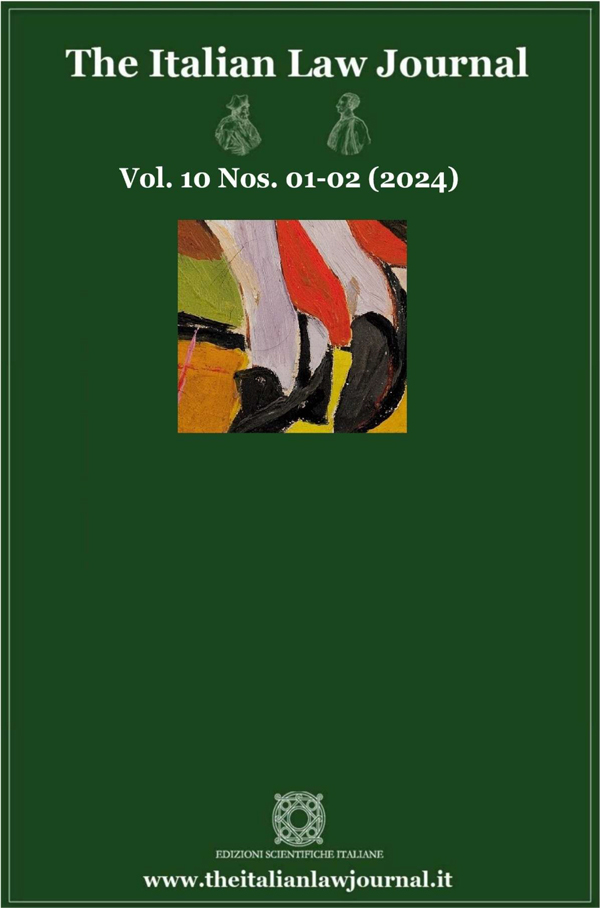11 THE ITALIAN LAW JOURNAL NO. 2 (2025) ESSAYS A Post-Normal Science Framework for Rethinking EU AI Governance
by C. Amodio Taking its vantage point from the Post-Normal Science (PNS) framework, this paper examines how the governance of artificial intelligence (AI) has become a test case for democratic societies confronting conditions where ‘facts are uncertain, values in dispute, stakes high, and decisions urgent.’ [...] _____________________________
Questioning the Impartiality of Public Administration
by P. D’Anselmi The purpose of the article is to show the existence of a ‘vertical partiality’ of public administration managers vis-à-vis the citizens. The public managers observed here are public prosecutors as the gate keepers of criminal justice. The performance parameter that is measured is conviction rates in three countries: the US, England and Wales, and Italy. […]
____________________________
Corrective Justice in Contract Law: A Comparative Law Analysis
by L.A. DiMatteo and J. Halberda An overlooked element of contract law is the importance of corrective justice principles in maintaining its credibility. The civil and common laws possess flexible principles under the guise of numerous names such as abuse of right in civil law and estoppel in common law, as well as the duty of good faith in various degrees in both legal traditions. […] _____________________________
The Limits of the Social in Law and Thought
by J.L. Esquirol Labor protections originate from a notion of ‘the social’, particularly prominent in 20th century Italy. That notion justifies deviations from classical liberal law. Indeed, it has come to provide the main paradigm for the protection of vulnerable interests of any kind. It is, however, the product of a certain time and place – available only under certain conditions, types of states, legal political economy […]
____________________________
Money Governance: Accommodating Complementary Currencies in the European Legal Framework
by G. Gimigliano Complementary currencies (CCs) are means of exchange other than official currencies and perform ancillary functions: from local development to social and financial inclusion, from recovery following disasters or wars to fostering intergenerational solidarity, and pursuing environmental policy priorities. […]
___________________________ Human Rights Risks in AI Regulation: A Comparative Study of Italy and Albania
by A. Mazelliu, L. (Burnazi) Mitllari and E. (Methasani) Çani This research explores human rights implications and potential risks associated with the deployment of Artificial Intelligence (AI) in Albania and Italy, adopting a comparative research approach. It analyses the AI-related international framework that binds Italy and Albania through supranational mechanisms. [...]
____________________________
Content Moderation and Freedom of Expression Online
by C. Perlingieri This article examines the relationship between freedom of expression by individuals online and content moderation activities carried out by platforms. The study analyses current regulatory frameworks, including that under European law, to assess the limits of compatibility between platform-driven moderation and the rights of platform users. […]
SHORT SYMPOSIUM ‘REVISITING THE COMMONS: LAW, CRISIS AND SOCIAL STRUGGLE’
by M.F. De Tullio This paper analyses how EU economic governance – especially austerity and the Next Generation European Union (NGEU) framework – exacerbates Italy's territorial disparities and spatial injustice. Specifically, it investigates how Commons and pact-based instruments interact with democracy and equality. [...] _____________________________
The Commons Between Law, Space, and Belonging
by A. Quarta The purpose of the article is to show the existence of a ‘vertical partiality’ of public administration managers vis-à-vis the citizens. The public managers observed here are public prosecutors as the gate keepers of criminal justice. The performance parameter that is measured is conviction rates in three countries: the US, England and Wales, and Italy. […]
____________________________
The Persistence of the Positive: Reflections on Research into the Commons
by M. Spanò This review-essay deliberately brackets the analysis of Veronica Pecile’s book, Law, Social Movement and the Politics of the Commons in its empirical or thematic content, in order to focus instead on what might be called its ‘form of content’. The book thus becomes the occasion for a reflection on the modes of research on the commons, on the ethos of the researcher, […] HARD CASES
by G. Gilleri and M. Bassetti This article presents and criticises the Italian Constitutional Court’s judgment no 143 of 23 July 2024 dealing with the judicial requirements for legal gender recognition. The judgment has declared Art 31, para 4 of decreto legislativo no 150 of 2011 unconstitutional in that it subjects to judicial authorisation medical and surgical treatments aimed at modifying sex characteristics. [...] _____________________________
An Untold Legal History of Nonbinaries
by M.M. Winkler Building on the recent decision of the Italian Constitutional Court on the case of a nonbinary individual, this article offers a general overview of the legal status of nonbinaries, providing critical insights into its historical evolution and the current comparative scenario. […]
CORPORATE AND FINANCIAL MARKETS LAW
by D. Mizerski The article analyses the provisions of Directive 2017/828 concerning the regulation of transactions with related parties. It explores their impact on companies operating within capital groups and the manner in which they have been implemented into the Polish, German and Italian legal systems. [...] INSIGHTS AND ANALYSES
by I. Allegranti This paper examines the recognition of the ‘right to remain in your own homeland’ within international law. This right is grounded in Art 13 of the Universal Declaration of Human Rights and is linked to the principle of self-determination under Art 1 of the UN Charter. This right reflects the deep, multidimensional ties between individuals, communities, and territory, [...] _____________________________
Digitization of Art, NFTs, and Tools for the Circulation of Creative Works
by E. Andreola The purpose of this paper is to examine the effects of the digitization of creative works on both the subjective right of access to culture and art and the new modes of exchange in the digital market for artistic works. When digitization becomes crypto-art and creations are represented by NFTs, the question arises as to whether the contractual […]
____________________________
Reasonable Accommodations for People with Disabilities in Italian Legislation Today
by L. Calcaterra This essay explores the evolution and current status of reasonable accommodations for people with disabilities in Italian legislation, particularly following the crucial Decreto Legislativo no 62/2024 reform. It analyzes the necessary balance between constitutional principles, such as entrepreneurial freedom (Art 41) and social assistance (Art 38), and the duty to provide these accommodations. […] _____________________________
Towards Sustainability: The European Regulatory Framework for Green Finance in Real Estate
by L. Casalini The European Union (EU) has recently introduced a series of legislative measures to facilitate access to green finance for households and small to medium-sized enterprises (SMEs). This paper aims to provide an overview of the European legislative framework and recent European Court of Justice (ECJ) cases, […]
____________________________
Environmental Sustainability and Misleading Practices in the Italian Jurisdiction
by A. Cinque The article traces the evolution of European and Italian efforts to combat greenwashing and promote environmental sustainability. First, it reviews the EU’s broad legislative framework, and then examines Italy’s layered approach, where consumer-protection rules, corporate-governance duties and competition law already sanction misleading environmental claims. […]
___________________________ Human Rights Risks in AI Regulation: A Comparative Study of Italy and Albania
by A. Mazelliu, L. (Burnazi) Mitllari and E. (Methasani) Çani This research explores human rights implications and potential risks associated with the deployment of Artificial Intelligence (AI) in Albania and Italy, adopting a comparative research approach. It analyses the AI-related international framework that binds Italy and Albania through supranational mechanisms. [...]
____________________________
Content Moderation and Freedom of Expression Online
by C. Perlingieri This article examines the relationship between freedom of expression by individuals online and content moderation activities carried out by platforms. The study analyses current regulatory frameworks, including that under European law, to assess the limits of compatibility between platform-driven moderation and the rights of platform users. […]
SHORT SYMPOSIUM ‘REVISITING THE COMMONS: LAW, CRISIS AND SOCIAL STRUGGLE’
Democracy and Spatial Justice in Times of Austerity. Creative Use of Law in Italian ‘Emerging Commons’
by M.F. De Tullio This paper analyses how EU economic governance – especially austerity and the Next Generation European Union (NGEU) framework – exacerbates Italy's territorial disparities and spatial injustice. Specifically, it investigates how Commons and pact-based instruments interact with democracy and equality. [...] _____________________________
The Commons Between Law, Space, and Belonging
by A. Quarta The purpose of the article is to show the existence of a ‘vertical partiality’ of public administration managers vis-à-vis the citizens. The public managers observed here are public prosecutors as the gate keepers of criminal justice. The performance parameter that is measured is conviction rates in three countries: the US, England and Wales, and Italy. […]
____________________________
The Persistence of the Positive: Reflections on Research into the Commons
by M. Spanò This review-essay deliberately brackets the analysis of Veronica Pecile’s book, Law, Social Movement and the Politics of the Commons in its empirical or thematic content, in order to focus instead on what might be called its ‘form of content’. The book thus becomes the occasion for a reflection on the modes of research on the commons, on the ethos of the researcher, […] HARD CASES
The Italian Constitutional Court’s Decision no 143 of 23 July 2024: Institutional Pathologisation Through the Prism of Binary Normativity
by G. Gilleri and M. Bassetti This article presents and criticises the Italian Constitutional Court’s judgment no 143 of 23 July 2024 dealing with the judicial requirements for legal gender recognition. The judgment has declared Art 31, para 4 of decreto legislativo no 150 of 2011 unconstitutional in that it subjects to judicial authorisation medical and surgical treatments aimed at modifying sex characteristics. [...] _____________________________
An Untold Legal History of Nonbinaries
by M.M. Winkler Building on the recent decision of the Italian Constitutional Court on the case of a nonbinary individual, this article offers a general overview of the legal status of nonbinaries, providing critical insights into its historical evolution and the current comparative scenario. […]
CORPORATE AND FINANCIAL MARKETS LAW
The Regime of Related Party Transactions from the Perspective of Intra-group Transactions
by D. Mizerski The article analyses the provisions of Directive 2017/828 concerning the regulation of transactions with related parties. It explores their impact on companies operating within capital groups and the manner in which they have been implemented into the Polish, German and Italian legal systems. [...] 
The Uncertain Glory of Public Prosecutors
A Comparative Approach



























